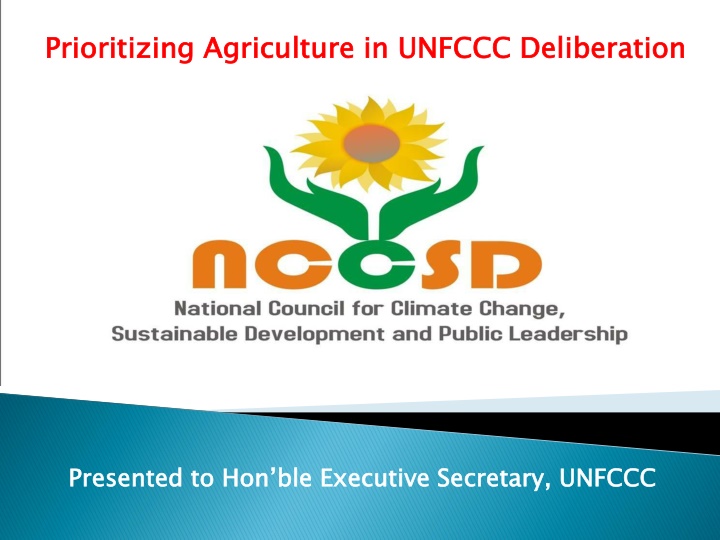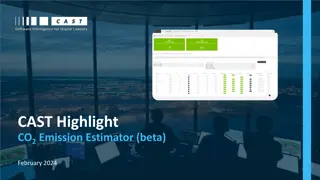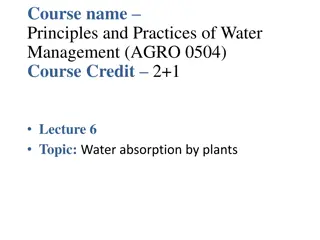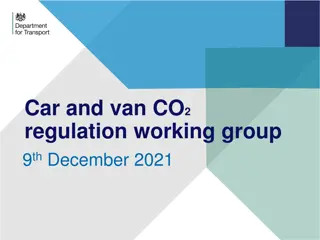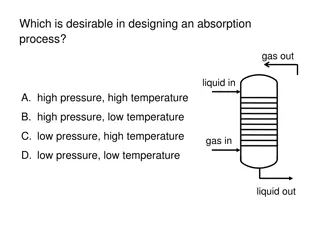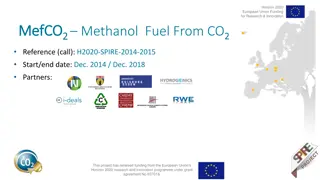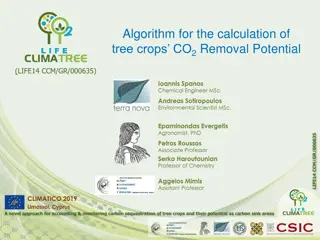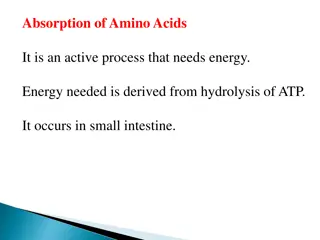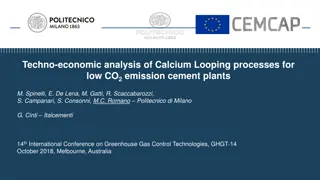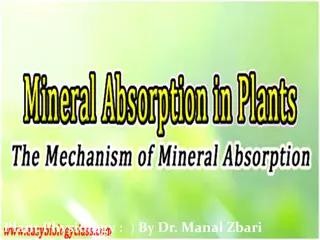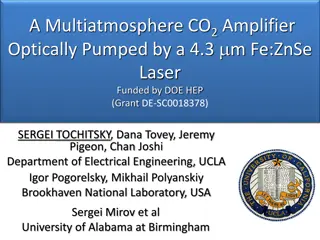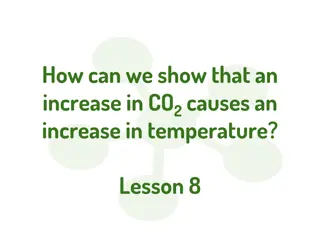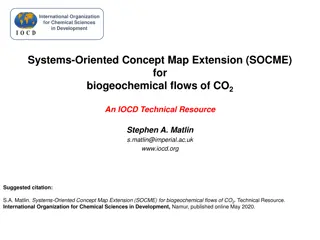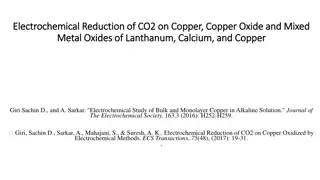Enhancing CO2 Absorption Through Prioritizing Agriculture in UNFCCC Deliberation
COP 24 aims to address the challenges of global warming but faces obstacles in reducing CO2/GHG emissions. Emphasizing agriculture as a key solution due to its CO2 absorption capabilities can lead to breakthroughs. Implementing measures like modern technology in agriculture and promoting initiatives to increase CO2 absorption can significantly impact climate change mitigation efforts globally.
Download Presentation

Please find below an Image/Link to download the presentation.
The content on the website is provided AS IS for your information and personal use only. It may not be sold, licensed, or shared on other websites without obtaining consent from the author.If you encounter any issues during the download, it is possible that the publisher has removed the file from their server.
You are allowed to download the files provided on this website for personal or commercial use, subject to the condition that they are used lawfully. All files are the property of their respective owners.
The content on the website is provided AS IS for your information and personal use only. It may not be sold, licensed, or shared on other websites without obtaining consent from the author.
E N D
Presentation Transcript
Prioritizing Agriculture in UNFCCC Deliberation Prioritizing Agriculture in UNFCCC Deliberation Presented to Hon ble Executive Secretary, UNFCCC Presented to Hon ble Executive Secretary, UNFCCC
Overall objective of COP 24 is brining mutually agreed solution to meet challenge paused by global warming. But major obstacle to this process is Non-agreement on CO2/ Green House Gases (GHG) reduction. Current attention is on reduction all initiatives like carbon credit- technology bank etc. pay attention to industries as focal point of GHG emission. But positive action lies in supporting initiatives which can increase absorption of CO2. Agriculture Vegetable - is only known technology which absorb CO2 by photosynthesis process and it is nature s tool to provide livelihood and food security. There is no other similar technology.
Absorption CO2 by agriculture is increasingly reduced by rapid expansion agricultural land which is coming into non-agriculture activities which simultaneously enhance discharge of CO2. Non- industrialization, Railway/Ports). While use there may not be agreement reduction of Green House Gases (GHG) emission principles for this there will be no dispute. agriculture use are infrastructure - urbanization, (Road/ mining
Hence, if agriculture is prioritized by UNFCCC in world deliberation major breakthrough can be made in increased CO2 absorption with following measures: Brining new area under agriculture by using modern technology to use Fallow and barren land Waste land Wet land Margin areas of coastline and desert Use of micro-irrigation technology to take double cropping Use of water conservation measures to bring dry land area for multiple cropping (One crop followed by short-term vegetable crops and/or fodder) Use of community and individual Bio-gas plants to channelize Methane gas for converting vermin compost as a domestic fuel for rural areas
There are known technologies and experiences exists in many parts of world where such initiatives have paid rich dividends in some countries in world and even within other countries in some parts. But such knowledge is not available across the world on uniform basis due to lack of transfer technologies from counties which have these technologies to countries which do not have the same.
Further numbers of countries do not have financial resources to convert such waste lands into productive resources as it is as it capital intensive. Further even agriculture research - across the world is not focused on species which can enhance CO2 absorption even substantive research does not exist to know existing plant species absorb higher CO2 like Neem (Azadirachta Indica), Baval (Prosopis juliflora), Vad / Banyan (Ficus benghalensis) etc.
Urban centres and industrial areas have to keep OpenLand as per Town Planning Regulations same is for infrastructure projects. But no policy exists to cover all such areas into vegetative cover. Even no strong policy exists to promote agriculture by residents of urban centres in their house roof top balconies.
Finally farming is becoming increasingly non-profit business for small farmers as realized in an national sample Survey India where in 60% farmers do not like farming and would like to move out if alternate livelihood is available. Many parts of world are experiencing huge migration to urban centres with devastating effects on existing urban infrastructure with mushrooming of urban slums. All these have already impact on reduced agriculture growth throughout the world and while demand is growing rapidly for food, dairy products & meat with increase in urbanization middle class. This encourages internal social conflict and emergence of violent groups.
It is therefore felt that world leadership needs to look at agriculture and priorities it for some effective steps in UNFCCC deliberations. Focus on: Accepting role of agriculture for reducing global warming. Allocating targets for bringing new areas under vegetation at least compensate what is being lost. Set up KnowledgeBank with effective dissemination and communication network. Develop incentive policy for bringing wasteland wetland margin areas of desert and sea coast under agri cover. Incentivize focused research on useful plants which absorb maximum CO2 and promote Biogas plants. Make use of open centres in urban areas and promote kitchen gardens.
Parties to conference are aware but overall environment in deliberation is focused on GHG reduction policy not absorption Policy. Hence, their concentration is on that part but they visualize reduction in GHG may result in dropping growth of industrialization which adds to wealth at a much higher rate than agriculture. Hence, there is reluctance delay deliberation soon and os forth in one after another Meet but no country will have objection to promote agriculture as food security is even greater threat than global warming.
But, these key-note must come from above by United Nation which is the Apex body. Through Executive Secretary, UNFCCC - NCCSD requests consideration of above by Secretary General of United Nations (UN) with two requests: Being up above in his address to world leaders. Ask existing UN organization involved in promotion of agriculture to focus on above by expanding their current role these are FAO, WFP, IFAD, ICRISET, ACCADA, UNEP in addition to World Bank and UNDP. Give them a clear mandate.
Dr. Kirit Shelat Executive Chairman National Council for Climate Change, Sustainable Development and Public Leadership (NCCSD) Post Box No. 4146, Navrangpura Post Office, Ahmedabad 380 009. Gujarat, INDIA. Phone: + 91 79-26421580 (Off) + 91 9904404393(M) Email: info@nccsdindia.org Web: www.nccsdindia.org
